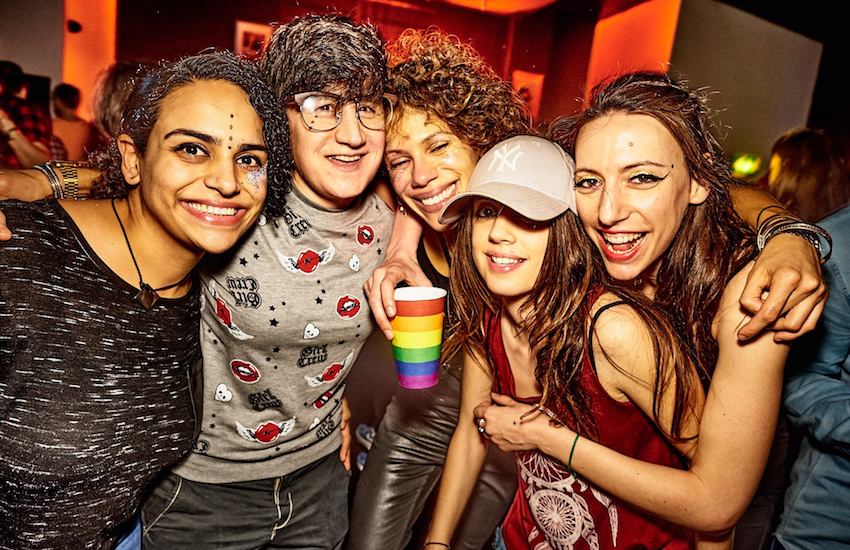How boozy was your LGBTI on campus society? | Photo: Winter Pride (archive photo)
Put yourself in the position of an LGBT+ student arriving in a new place for university or college.
Maybe they’re closeted and want to remain so. Maybe they want to come out in their first year. Or as is increasingly common, maybe they have already come out at school or college.
For some, arriving in this new place is exciting, an opportunity to love who you want to love, sleep with who you want and present yourself however you want.
For others, these are all a new set of dangers and people to come out to – or hide the truth from.
As many students are too old for a local LGBT+ youth group, if their town even has one, but too young for a general community LGBT+ group; the university or college LGBT+ society can be the ideal if not only place to find support.
They should be providing social events centered on LGBT+ culture and people. The best do, whilst also providing welfare resources for people having queer sex, LGBT+ campaigns and representation that builds on our rich history of liberation, radicalism, and protest of the past.
A well functioning LGBT+ society can make the difference to a new student at university or college. But not enough are.
Research shows 1 in 4 students don’t engage with their LGBTI society
Much to my frustration as a national representative of LGBT+ students – many have work to do.
The new Student Minds LGBT+ survey reveals that too many students don’t feel at home in their LGBT+ society.
The leadership of many societies fails to connect with huge parts of their membership. All of this leads to allegations of ‘cliqueyness.’
NUS LGBT+ Campaign research shows this is especially the case for queer, trans and intersex people of color (QTIPOC.)
They do not see themselves represented in what can be a very white gay scene.
The Student Mind research also reveals that the social space that many LGBT+ societies are too alcohol and night-life driven.
This is making sober students much more isolated in what should be their home.
‘A women’s only social was answered with a demand for a men’s social’
One of the reasons why I stood for election in the NUS LGBT+ Campaign was that university and college LGBT+ societies need more support to fulfill the myriad needs and demands of LGBT+ students.
My experience of university gay life was overwhelmingly positive. I have met many life-long friends as well as the man I am to marry!
It was not, however, without its challenges.
While we had a variety of opportunities to socialize, including in many sober environments, we often struggled to organize outward-facing campaigns. Our volunteer welfare officers often felt unsupported, and new students did not feel welcome.
We found that women, trans people and/or QTIPOC in our spaces struggled to make those spaces their own. An idea for a women’s only social was answered with a demand for a men’s social, despite the plethora of men in our social spaces.
My experience was far from unique. The nature of developing a student LGBT+ space is challenging. It relies on all-volunteer labor and often little funds or staff support. It means that failure along one metric or another is inevitable.
Moreover, when you’ve struggled to develop a community in just a year, maintaining that and welcoming new students is difficult.
So when your alcoholic socials are popular but your coffee mornings are dead it’s no wonder that social secs plan bigger and bigger nights out while non-alcoholic socials dwindle.
LGBT+ societies and those that run them are in desperate need of support, both from their Students’ Unions and from national LGBT+ organizations.
Universities and Student Unions need to step up their support
If a newly out student is disillusioned by their first LGBT+ space, why should they feel enthusiastic about the next one they enter?
We have a duty as student leaders and members of the LGBT+ community to strive for inclusive and supporting LGBT+ societies on campus.
This year, NUS LGBT+ Campaign will be working to provide a framework for quality LGBT+ societies, and working with LGBT+ student leaders to implement that framework in students’ unions.
Broadly, an LGBT+ group on campus needs to provide representation, welfare support, organized social and a campaigning network.
Having a campaigning and politicised LGBT+ society that fails to provide welfare support does not do the radical work of building communities.
An LGBT+ society which is completely dedicated to nights out will not be able to challenge the political issues inside those spaces, such as sexual harassment, misogyny, and racism.
Only by supporting LGBT+ students in all those areas will LGBT+ societies have something for everyone and shake off the reputation of being a cliquey, catty drinking society.
NUS cannot do this on our own. So consider this a call to action for LGBT+ student leaders across the country:
We are ready to have those hard conversations and strive with you for a better world. Are you?
Eden Ladley is the NUS LGBT+ Officer (Women’s Place), follow @NUS_LGBT+ on Twitter
More from Gay Star Students:
Two queer students struggling with insomnia talk about how to cope
Singapore students hit out at school for disinviting LGBT speaker







